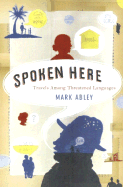Spoken Here: Travels Among Threatened Languagues

by Mark Abley
ISBN: 0679311017
Post Your Opinion | | A Review of: Spoken Here: Travels among Threatened Languages
by A. J. LevinKivunjo has sixteen genders. Finnish, with its fifteen cases to
decline, is among the easiest languages for infants to learn. Chinese
has different forms of number. You cannot simply say "five",
you must use a different "five" if you are talking about
people, horses, bicycles, turnips, napkins, pencils, or guns.
Yiddish-speakers have at their disposal myriad words for "fool",
each with its own subtle difference in meaning. Those differences-say,
between nar, idyot, tippish and schmegegi-may seem negligible to
outsiders, but they are nevertheless meaningful.
Such idiosyncrasies are a large part of what makes language
interesting: where it places its values, how it reflects its
traditions and the culture around it, how it categorizes the universe
and its contents.
Montreal poet and journalist Mark Abley's book is part travelogue
and part meditation on endangered languages. Abley has already
captured the extinction of a language beautifully in the title poem
of his collection Glasburyon (Quarry, 1994):
Each time we lose a language
the ghosts who made use of it
cast a new bell.
In Spoken Here, Abley, wearing his journalist's hat this time, shows
how language is intimately connected to identity, culture, geography,
psychology, and religion, and how the loss of a language is also
the loss of a philosophy, a set of emotions, even a kind of science.
Don't be fooled by the book's index and substantial end matter.
This is not primarily a scholarly work. Apart from a brief mention
of Chomsky and some shortcomings in his theories of language
acquisition, Abley shies away from linguistics, focusing instead
on the meaning of language to its speakers, and always with empathy
and generosity.
Throughout the book, the author argues that every language is a way
of thought, a Tao. How do speakers of a tongue divide the world
into concepts? What do their characteristic idioms say about their
worldview? What role do time and space play (some languages have
no tenses; others have separate verb roots for ongoing and limited
action)? What strange short words are there, and what insight does
this give us? In Boro, for instance, which is spoken in the northeast
of the Indian subcontinent, zogno means "the sound made when
mud and water mix when you put your hand into a crab's hole."
Two ways to say "even though" in Ancient Hebrew mean,
literally, "ear on the mouth" and "ear on the
back." Abley takes a small, wilful step away from English, in
his words the Wal-Mart of languages, and rewards us with a giant
leap of the mind.
Abley alternates between thoughtful essays about the meaning and
history of language in general, and case studies of dead and dying,
and some revived, languages, including Marri-Djabin, spoken by some
Australian Aborigines; Yuchi, known only by a handful of native
Oklahomans; Manx; Boro; Provenal; Mohawk; Yiddish; and Welsh. In
the process, he raises some profound and even disturbing moral
issues. In contrast to most First Nations languages, for example,
with their heavy reliance on verbs and on the second person,
Indo-European tongues concentrate on nouns and the first-person
singular. Does this mean that Westerners accord more importance to
possessions and their own rights and privileges, than to the
consequences of their actions?
Abley's collection is a little too long at over 300 pages, some of
the chapters are less focused than others, and the author tends to
wander, particularly when he is not dealing with a specific language
(e.g. in "Humboldt's Parrot"). At his best, though, when
his search for endangered languages takes him to several continents
and leads him to interview a wide mix of lively and engaging people,
he writes with the fluidity and conviction of Paul Theroux or Bill
Bryson.
|